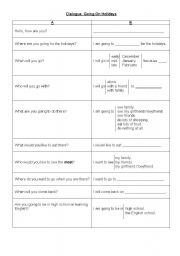
|
Dialogue: Going On Holidays - Low Elementary Level
This is a structured dialogue which you give low-level elementary students. It is about their future plans for the holidays.
Split the class into lines - A and B. You need even numbers to do this. Person A asks questions, person B answers them. Then swap A and B around. You ideally use this as a starter or plenary.
Level: elementary
Age: 14-17
Type: worksheet
Downloads: 16
|
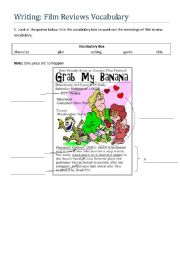
|
Film Reviews I
This is the first of two worksheets designed to step elementarty-level students through the process of writing a film review. The first step is to learn some film terminology through the mock-up film poster. (It was taken from another resource also found on here - I forgot the name of the file I took it from but thank you in advance).
The seco...
Level: elementary
Age: 10-14
Type: worksheet
Downloads: 46
|

|
France - Low-Level Elementary Fact File
A simple, low-level comprehension for elementary students about France.
Simply get each student to find the keywords in the questions on the right, relate them to keywords in the fact file on the left, and write.
You can use the questions to form a structured speaking task as well by:
1. Collecting all the fact files the students have do...
Level: elementary
Age: 14-17
Type: worksheet
Downloads: 7
|
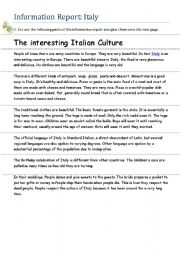
|
Information Report I
This is an information report kinaesthetic starter activity to introduce a class of elementary students to information reports. Students cut out the parts of an information report and glue them onto the next page. You can then use this as a starter point for discussion and analysis of its structure.
This is Part I. :-)
Level: elementary
Age: 10-14
Type: worksheet
Downloads: 7
|
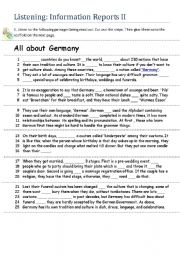
|
Information Reports II
In this worksheet, students do a listening task. The teacher reads out the information report on Germany to the class. Students fill in the blanks. The words are mainly simple verbs in the present tenses or prepositions, so it is useful for both elementary and beginning students. Then students cut and paste the information report onto the provided ...
Level: elementary
Age: 10-14
Type: worksheet
Downloads: 3
|
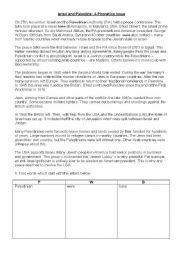
|
Israel and Palestine - A Phonetics Issue
Simply get the students to identify all the words which start with the letters in the document.
Pronounce the letters, get the students to repeat, then go through all the words they find. They will absorb at least symbol-sound association explicitly, which is what dyslexic students find very hard to do.
Level: elementary
Age: 14-17
Type: worksheet
Downloads: 9
|

|
Jealousy - Low-Level Elementary The Future Tense Exercise
The point of this �Jealousy� article is to teach the students how to spot the future tense, find similar phonemes and read them out.
How do you do this?
1. Get the students to only look for the words "will" and "going to".
2. Get students to write out ten sentences for "will" and "going to". They�ll most likely use the passage.
3. Get t...
Level: elementary
Age: 14-17
Type: worksheet
Downloads: 7
|
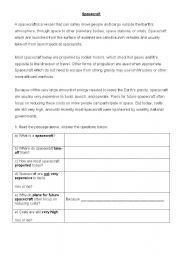
|
Spacecraft - Low-Level Elementary Comprehension
This worksheet has two short comprehensions in it.
The first one has key words put in bold so that the students know what to look for. The second one has no keywords but is very short so the keywords are obvious.
If the students are weak in reading, make sure they know how to search for the keywords in the passage by looking for the word in ...
Level: elementary
Age: 14-17
Type: worksheet
Downloads: 13
|
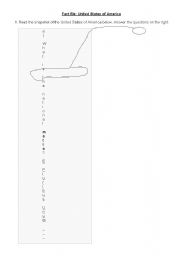
|
USA - Low-Level Elementary Fact File
A simple, low-level comprehension for elementary students about the US.
Simply get each student to find the keywords in the questions on the right, relate them to keywords in the fact file on the left, and write.
You can use the questions to form a structured speaking task as well by:
1. Collecting all the fact files the students have do...
Level: elementary
Age: 14-17
Type: worksheet
Downloads: 4
|
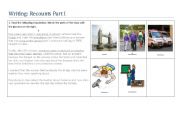
|
Writing Recounts Part I
This worksheet is a stepping stone in writing a recount. It steps the reader through looking at pictures and matching them to a piece of text to test comprehension. It then has a gapfill which allows the students to complete the gaps with what is happening, and students then progress up to writing their own recounts.
Level: elementary
Age: 10-14
Type: worksheet
Downloads: 7
|